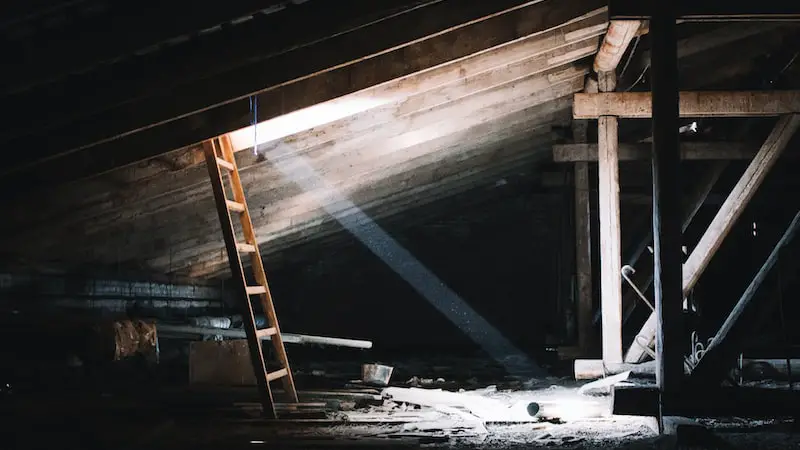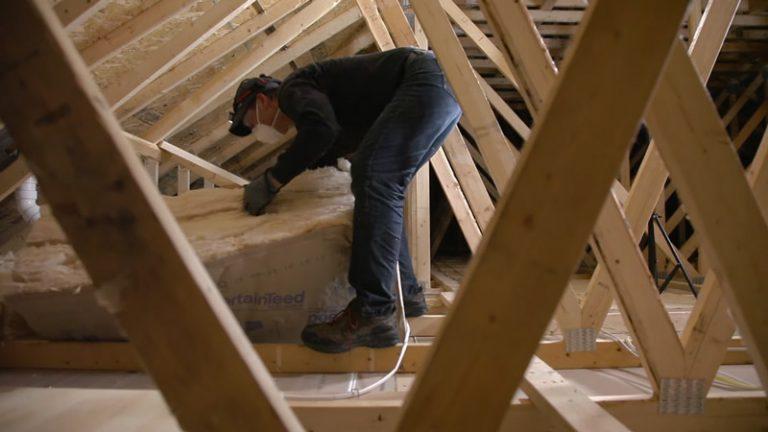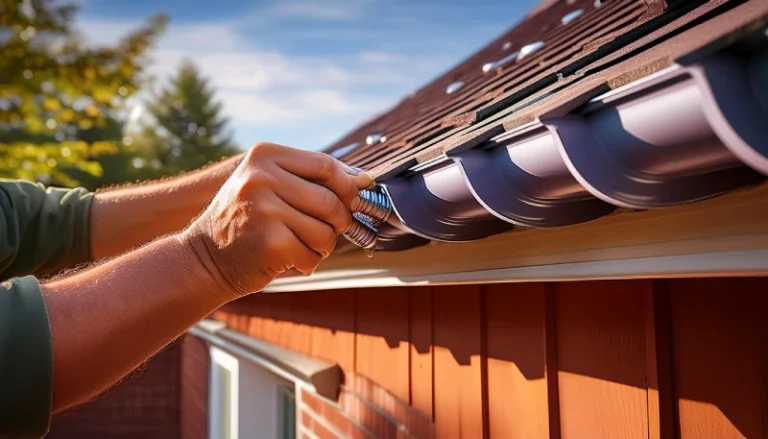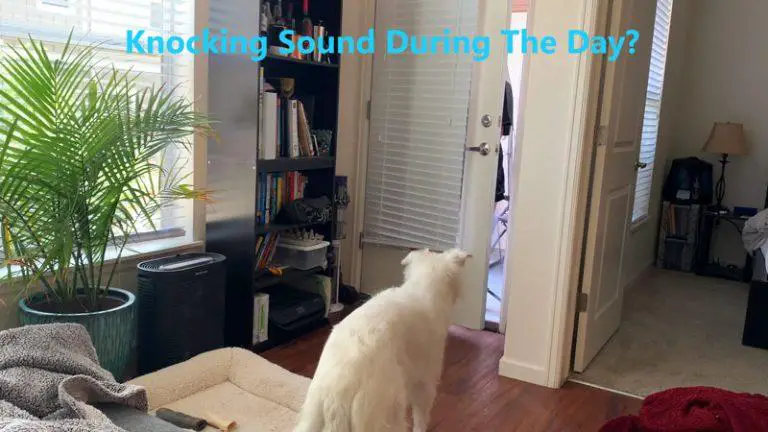Why Do I Hear Banging Noise in Attic When Windy?

Banging noises in the attic can be a source of annoyance and inconvenience. These noises can occur for a variety of reasons, including loose shutters or vents, branches hitting the roof, heating ducts contracting, water pipes banging, building materials expanding and contracting, and animals moving around in the attic.
In this article, we will explore the various causes of banging noises in the attic and provide tips for reducing or eliminating these noises.
You'll Learn About
Reasons of Banging Noise in Attic When Windy
There are many reasons behind the banging noise in attic. But Generally, these Noises are of two kinds, one is house noise, the other is animal creates noise.
Loose shutter on an attic window or loosened attic vents
If a shutter or vent in the attic is not securely fastened, it can move and bang against the window or vent frame when the wind blows. This can create a loud and persistent noise.
A loose shutter on an attic window or loosened attic vent can cause a banging noise in the attic when windy because the wind can push the shutter or vent, causing it to move and bang against the window or vent frame.
This can create a loud and persistent noise. Additionally, the movement of the shutter or vent may also cause other objects in the attic to shift and bang against each other or against the walls or ceiling.
Branches hitting the roof
If there are trees near the house, branches can sway and hit the roof during windy weather. This can cause a banging or thumping sound.
Causes
- Trees near the house
- Windy weather
Explanation
- If there are trees near the house, their branches can sway and hit the roof when the wind blows.
- This can cause a banging or thumping sound in the attic.
- The movement of the branches can also create vibrations that travel through the roof and into the attic, making the noise louder and more noticeable.
Preventative measures
- Trim trees regularly to prevent branches from getting close to the roof.
- Install protective barriers, such as screens or guards, around windows and vents in the attic to prevent branches from hitting them.
- Secure loose objects in the attic to prevent them from being knocked over by the wind.
Heating ducts as they cool
Causes
- Heating system turned off
- Cooling of heating ducts
- Contraction of heating ducts
Explanation
- When the heating system is turned off, the heating ducts begin to cool down.
- As they cool, the heating ducts contract.
- This contraction can cause a banging noise in the attic.
Preventative measures
- Insulate the heating ducts to prevent them from cooling too quickly.
- Secure the heating ducts to the walls and ceiling to prevent them from moving and banging against them.
- Install dampers in the heating ducts to regulate the flow of air and reduce the likelihood of sudden changes in temperature that can cause the ducts to contract.
Other potential causes
- There may be other reasons why heating ducts can make a banging noise, such as debris getting stuck in the ducts or a misaligned joint causing the ducts to rub against each other. In these cases, it may be necessary to have a professional inspect and repair the heating ducts to eliminate the noise.
Radiators
Radiators use hot water or steam to heat a room. As the water or steam cools down, it can cause the radiator to contract and make a banging noise.
Causes
- Hot water or steam cooling down
- Radiator contracting
Explanation
- Radiators use hot water or steam to heat a room.
- As the water or steam cools down, it can cause the radiator to contract.
- This contraction can create a banging noise in the attic.
Preventative measures
- Insulate the radiator to prevent it from cooling too quickly.
- Secure the radiator to the wall to prevent it from moving and banging against it.
- Bleed the radiator to remove any air bubbles that may be causing the water or steam to cool down too quickly and cause the radiator to contract.
Other potential causes
- There may be other reasons why a radiator can make a banging noise, such as a faulty valve or a buildup of minerals in the water. In these cases, it may be necessary to have a professional inspect and repair the radiator to eliminate the noise.
Water pipes (water hammers)
- Sudden change in water flow
- Pipe banging against a wall or other surface
Explanation
- Water hammers are a common cause of banging noises in houses.
- They occur when a sudden change in water flow causes a pipe to bang against a wall or other surface.
- This can happen when a faucet is suddenly closed, or when a washing machine or dishwasher starts or stops.
- The banging of the pipes can create a loud and persistent noise in the attic.
Preventative measures
- Install air chambers or shock absorbers in the water pipes to absorb the shock of the water flow and prevent the pipes from banging against the walls or other surfaces.
- Secure the water pipes to the walls and ceiling to prevent them from moving and banging against them.
- Repair any leaks or faulty valves that may be causing sudden changes in water flow.
Other potential causes
- There may be other reasons why water pipes can make a banging noise, such as high water pressure or a faulty pump. In these cases, it may be necessary to have a professional inspect and repair the water pipes to eliminate the noise.
Expanding and contracting Building Materials
Causes
- Expansion of building materials when heated
- Contraction of building materials when cooled
- Movement of building materials during temperature changes
Explanation
- All materials expand when they are heated and contract when they are cooled.
- This can cause a variety of noises, including banging, as the materials in a house expand and contract in response to changes in temperature.
- The movement of the materials can also cause other objects in the attic to shift and bang against each other or against the walls or ceiling.
Preventative measures
- Use materials that are less susceptible to expansion and contraction, such as steel or concrete, in the construction of the attic.
- Insulate the attic to prevent sudden changes in temperature that can cause the materials to expand and contract.
- Secure loose objects in the attic to prevent them from being knocked over by the movement of the building materials.
Other potential causes
- There may be other reasons why building materials can make a banging noise, such as a structural defect or damage to the materials. In these cases, it may be necessary to have a professional inspect and repair the attic to eliminate the noise.
Raccoons or Opossums
Raccoons and opossums are common pests that can enter attics and make a lot of noise as they move around. They can jump across the floor, drag objects, and knock things over, all of which can create a banging noise.
Causes
- Presence of raccoons or opossums in the attic
- Rambunctious behavior of raccoons or opossums
Explanation
- Raccoons and opossums are common pests that can enter attics and make a lot of noise as they move around.
- They can jump across the floor, drag objects, and knock things over, all of which can create a banging noise in the attic.
- The movement of the animals can also cause other objects in the attic to shift and bang against each other or against the walls or ceiling.
Preventative measures
- Install barriers, such as screens or guards, around windows and vents to prevent raccoons and opossums from entering the attic.
- Seal any holes or gaps in the attic that may provide access for the animals.
- Use traps or repellents to remove raccoons and opossums from the attic.
Other potential causes
- There may be other reasons why raccoons and opossums can make a banging noise in the attic, such as fighting or mating. In these cases, it may be necessary to have a professional humanely remove the animals to eliminate the noise.
Tips for Preventing Banging Noise on Attic
Here are some tips to help reduce or eliminate banging noises in the attic:
- Identify the source of the noise: The first step in addressing a banging noise in the attic is to determine what is causing it. Look for loose objects or damaged materials that may be making the noise, and try to identify any patterns or triggers that may be contributing to the noise.
- Make repairs or replacements: Once you have identified the source of the noise, take steps to fix or replace any damaged or loose objects that may be causing the noise. This may include repairing or replacing a loose shutter, tightening a loose vent, or replacing a damaged pipe.
- Install soundproofing materials: Soundproofing materials, such as insulation, can help to reduce the amount of noise that is transmitted through the walls and ceiling of the attic. This can make it easier to hear the source of the noise and make it less noticeable to those in the rest of the house.
- Use white noise: White noise, such as the sound of a fan or a white noise machine, can help to mask or drown out the banging noise in the attic. This can make it less noticeable and help you to sleep or concentrate while the noise is occurring.
- Contact a professional: If you are unable to identify the source of the noise or if the noise persists after making repairs or replacements, consider contacting a professional. A contractor or pest control expert can help to identify and fix the problem and may have access to specialized tools or equipment that can help to eliminate the noise.
Frequently Asked Questions
Q: What causes banging noises in the attic?
A: Banging noises in the attic can be caused by a variety of factors, including loose shutters or vents, branches hitting the roof, heating ducts contracting, water pipes banging, building materials expanding and contracting, and animals moving around in the attic. Sometimes the house window also makes those noises.
Q: How can I reduce or eliminate banging noises in the attic?
A: To reduce or eliminate banging noises in the attic, you can try the following: identify the source of the noise, make repairs or replacements, install soundproofing materials, use white noise, and, if necessary, contact a professional.
Q: Are banging noises in the attic a sign of a serious problem?
A: Banging noises in the attic may be a sign of a serious problem if they are accompanied by other symptoms, such as leaks, mold, or structural damage. In these cases, it is important to contact a professional to assess and address the problem. Some people also hear footsteps at night.
Q: Can banging noises in the attic be harmful to my health?
A: Banging noises in the attic may not be directly harmful to your health, but they can cause stress and sleep disturbance, which can have negative effects on your overall health. It is important to take steps to reduce or eliminate the noises in order to maintain a healthy and comfortable home.
Q: Should I be concerned if I hear banging noises in the attic?
A: It is natural to be concerned if you hear banging noises in the attic, as they can be disruptive and potentially indicative of a more serious problem. However, it is important to carefully assess the situation and take appropriate action to address the source of the noise. In most cases, the noises can be easily resolved with the help of a professional.
Final Words
Banging noises in the attic can be caused by a variety of factors, including loose shutters or vents, branches hitting the roof, heating ducts contracting, water pipes banging, building materials expanding and contracting, and animals moving around in the attic.
To reduce or eliminate these noises, it is important to identify the source of the noise, make repairs or replacements, install soundproofing materials, use white noise, and, if necessary, contact a professional.
By following these tips, you can help to reduce or eliminate banging noises in your attic and enjoy a more peaceful and comfortable home.



